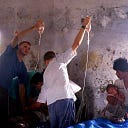Good skills (May 2020)
A frontline care worker sends a letter from lockdown, on the quiet vow he has made that his work matters
A week or two back, my colleague Jean swayed her head back gracefully to avoid being headbutted in the face by Alf.
“Good skills,” I said, continuing the running joke that you need the boxing know-how of Joe Calzaghe to deal with Alf’s tendency to go for you when his arms are being held gently but firmly by two other carers while you tear off the incontinence pad, wipe around, and get a new one on.
Alf is one of the residents on the 40-bed dementia unit I work in. He’s one of the more aggressive, especially when you need to attend to his bodily needs. A lot of the time Alf wanders, and is fine, though you have to keep an eye out.
About a third of the residents are “wanderers”. Another third are more or less immobile and range from the largely silent, buried deep in whatever world they now inhabit, to those who express their changing moods in what can be pretty colourful language. Another third are moving towards the end of life, at different paces; some twist into small tangled knots of sinew and bones, heads contorted but rhythmic in the nodding, while others are, well, heavy.
Forty very different people with very different needs require very different skills. There is, of course, the physical dexterity — how to sway away from the headbutt, how to arrange the hoist to minimize panic, which angle to use with a teaspoon feed when Irene’s knees are up by her chest.
But more than that, there’s the problem-solving and constant re-prioritization. For 12 hours, you’ve got to be on your game: ready to spring to a colleague’s assistance when one resident goes for another, ready to to help with an incident in the day room involving smeared poo.
But most of all, there’s the skill of seizing the opportunity to make a resident smile, even laugh, even if just for a second. Dementia, for most people, is a dark and deeply troubling world, most or all of the time; even before the masks came. Breaking through, just for a moment, with a memory of the old life — “you were a bus driver, weren’t you Alf? What was your route?” — is the most important thing you can do in a day, even if the next moment you’re a frightening, masked spectre and the bus route is gone.
Day to day, lockdown hasn’t changed very much on the unit. Yes, there are the masks and the visors made for us by the local high school, as we do what we can to keep the place Covid-free — we’re ok so far, touch wood, but every day you wonder how you’ll handle it if it’s there today. And of course there are no visitors, except the odd PPE’d relative coming in to say goodbye to a fading loved one.
But in general the rhythm of the day continues, punctuated by the outbursts of anger, panic, convulsions of misery, and the soothing reassurances that make up life on the unit. The rhythm is roughly fixed around mealtimes; I love the “assists” — the quiet time when I spend half an hour gently coaxing enough puree and fluid into Dorothy or Joseph, reminding both of us, with the odd glance of mutual recognition as humans, that they still count, and that what I’m doing counts too
None of the residents have the capacity to know what’s going on beyond its walls, and so for 12 hours at a stretch, nobody discusses the pandemic. Yes, it gets the odd mention at break time, but only as it affects practicalities of family life.
“Why the hell do we do this?”, or something similar, is a fairly regular expression of frustration I hear on the unit. It’s an expression of frustration at how tough the job can be, especially when we’ve run out of proper wipes again, but it’s a rhetorical one, because everyone knows the answer. When the answer is offered up, it’s something like “Well, nobody else gives a shit” or, from the gentle Nora, “Who else would look after these poor souls?”
Or the answer is enacted, in that near-end-of-shift sigh, “We can’t leave her like this”, as you help 97-year-old Myra retain the shred of dignity her 97 years still accords her; you clean her up, tidy her hair, give her a sip from the beaker, even though it’s past 8pm now and you’re being picked up.
In the end, most carers do what they do because they give a shit. And they do what they do, day in day out, in quiet solidarity with each other, because they’ve made a quiet vow, between themselves, that what they do matters.
And it’s the very quietness of that vow that makes carers being all over the news seem a bit odd. Suddenly, now that we’re in masks, we’re a skilled workforce that society can’t do without, for whom even the Home Office should change its rules. Suddenly, because the virus came, we could be professionals. After all, making a vow, even quietly, that you’ll use your skills for the best of humanity, is what makes you a professional.
I’m not convinced much is going to change, once the masks are gone. Change in the way care work is recognized needs wider change in the way predominantly women’s work, paid and unpaid, is recognized overall, and a changed understanding of what professionalism might mean. That still seems quite a long way off.
Still it’s nice, at least for a bit, to feel wanted. Even if the masks really itch after a few hours.
*All names are changed
